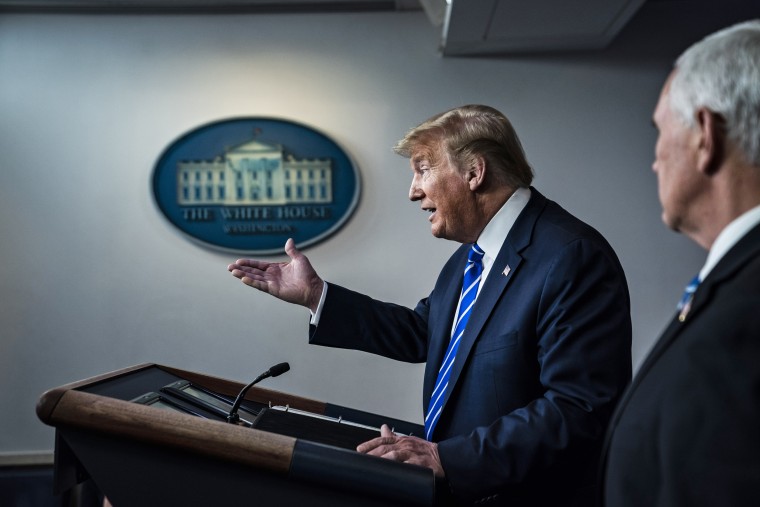The New York Times published a good analysis yesterday on one of the "recurring features" of Donald Trump's presidency: the Republican's "knack for detonating so many of our powerful shared experiences into us-versus-them grenades." The piece added that Trump has repeatedly "exhibited minimal interest in the tradition of national strife placing a pause upon the usual smallness of politics."
The thesis obviously applies the coronavirus crisis in ways that continue to expand. This morning, for example, the president thought it'd be a good idea to question why certain struggling states -- led by officials from a party he holds in contempt -- should receive federal aid during the pandemic.
"Why should the people and taxpayers of America be bailing out poorly run states (like Illinois, as example) and cities, in all cases Democrat-run and managed, when most of the other states are not looking for bailout help?" Trump tweeted Monday morning. "I am open to discussing anything, but just asking?" he added.
Remember, as we discussed this morning, Trump made several seemingly unambiguous statements in support of federal aid to states early last week, treating it as an issue with broad, bipartisan support. His new posture contradicts his position from last week, suggesting the president is receiving some misguided advice from Senate Majority Leader Mitch McConnell (R-Ky.).
Sen. Rick Scott (R-Fla.) apparently made some related comments this morning, telling reporters, "It's not fair to the taxpayers of Florida. We sit here, we live within our means, and then New York, Illinois, California, and other states don't. And we're supposed to go bail them out? That's not right."
At this point, we could explain the fact that many states are facing fiscal crises, not because of mismanagement or reckless budgeting, but because of a global pandemic. We could also explain that the consequences of adopting this far-right approach -- letting states and cities deal with deteriorating fiscal conditions through mass layoffs, for example -- would be a longer and an even more brutal economic downturn.
But for now, let's put those relevant angles aside to focus on something known in policy circles as "donor states."
Governing magazine explained last year, "Residents in Connecticut, Massachusetts, New Jersey and New York have some of the highest tax bills in the nation. They also pay thousands more in federal taxes than their state receives back in federal funding. In total, 10 states are so-called donor states, meaning they pay more in taxes to the federal government than they receive back."
The overall picture does not fall neatly along partisan or electoral lines, but half of the 10 donor states are in the northeast -- including New York, which many Republicans are suddenly reluctant to assist. The same list, incidentally, includes Illinois, which also sends more money to D.C. than it receives back.
Mitch McConnell's home state of Kentucky, meanwhile, is on the other end of the spectrum: more than almost any other state, the Bluegrass State receives more in federal funds than it sends to D.C.
Similarly, Rick Scott's Florida -- the president's adopted home state -- also receives about $3,000 more per resident in federal funds than it adds to the treasury in D.C. (In fact, the number of donor states in the southeast is literally zero.) When Florida was living "within its means," as Scott put it, the state was doing so thanks in part to donor states that were sending federal dollars its way.
In other words, states like New York and Illinois help subsidize states such as Kentucky and Florida -- all of which adds a degree of irony to the rhetoric we're hearing from the likes of McConnell, Trump, and Rick Scott.
Sen. Chris Murphy (D-Conn.) was understated about this on Twitter this morning, though he wrote, "If Florida would like to have a conversation about making sure no state gets more money from the federal government than they send to it, Connecticut is ready."

